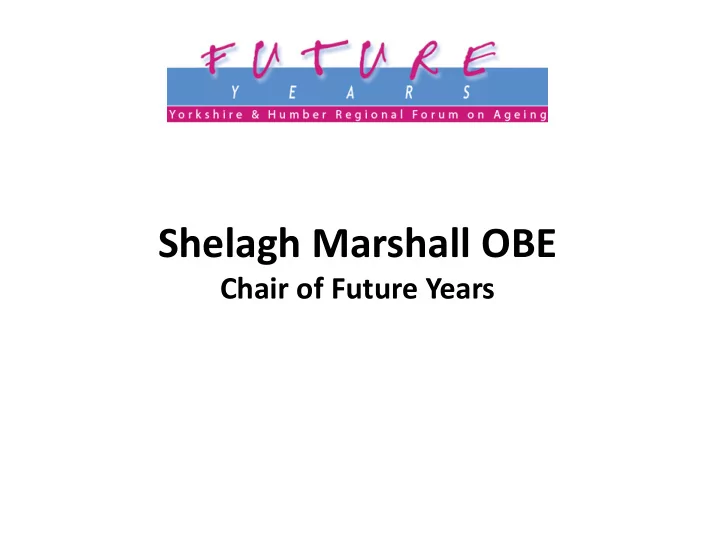

Shelagh Marshall OBE Chair of Future Years
The Concessionary Fares Schemes for older people and others. A National Debate Time for Change? Why Now? 29/10/2014 Shelagh Marshall 2
Contents Historical context Issues forcing change Present situation Challenges How can we influence any Government? Discussion group questions 29/10/2014 Shelagh Marshall 3
Historical context - transportation discretionary schemes Bus passes 50% discount for people over 65 years Included people with medical conditions who could not have a driving licence Some Authorities gave tokens to use on taxis, buses Rail travellers, senior rail card - discounted fares for people over 60 years Introduction of community transport services: buses; Dial a Ride, personalised service door to door, volunteer car schemes National scheme introduced in 2008 - free transport on all public bus services and across all administrative boundaries for people over 60 years with restriction on use 29/10/2014 Shelagh Marshall 4
Issues forcing change Political, economic and social challenges of changing national demographics - increasing numbers of older people The ONS projections: - by 2027 over 1 million people aged over 90 years and over 40,000 centenarians Changes to the Welfare State infrastructure (political, social and economic) The high numbers of older people living alone led to the launch of: ‘The Campaign to End Loneliness’ to reduce the devastating and painful effects of loneliness and transport is vital to reduce social isolation. National figures in 2005 show 28% of people aged 60+ used their bus pass at least once a week and by 2010 usage increased to 40% 83% of people aged over 85 years use their pass once a week 29/10/2014 Shelagh Marshall 5
Present situation Lack of services - growing numbers of older people with a bus pass and no bus services. The one pot of funding (RSG) for local authorities is being cut annually. Competing demands for services - funding for bus services for older people competing with funding for highways maintenance. Government cuts to Bus Service Operators Grant: 20% in 2012 Reduced numbers of fare paying passengers on public bus services leading to termination of some bus services (Many in rural areas) 29/10/2014 Shelagh Marshall 6
Challenges LAs encouraged to develop Community Transport using volunteer drivers. Passengers pay an annual subscription and a fare. Senior Railcards now cost £30 annually and offer a discount of one third. Many older people have expressed their wish to contribute financially to keep bus services operating and prevent further cuts – but the law on concessionary fares makes this illegal. More volunteer car schemes being developed. Overall lack of transport to get people to GP & day surgery and visiting 29/10/2014 Shelagh Marshall 7
How can we influence Government? Gather evidence of older people’s views and offer solutions based on their transportation needs Undertake research - a mixed methods approach using a questionnaire to gain responses/opinions: 1) a set of quantitative questions with tick boxes responses and 2) a set of qualitative questions to provide narratives (rich data) 29/10/2014 Shelagh Marshall 8
Discussion group questions 1. How many questions do you think will help us to gain reliable and valid data? 2. What questions do you think we should be asking? (Please prioritise) 3. Thinking outside the box – please brainstorm and list a range of measures to ensure older people can travel easily to remain socially active and reduce loneliness. 29/10/2014 Shelagh Marshall 9
Recommend
More recommend